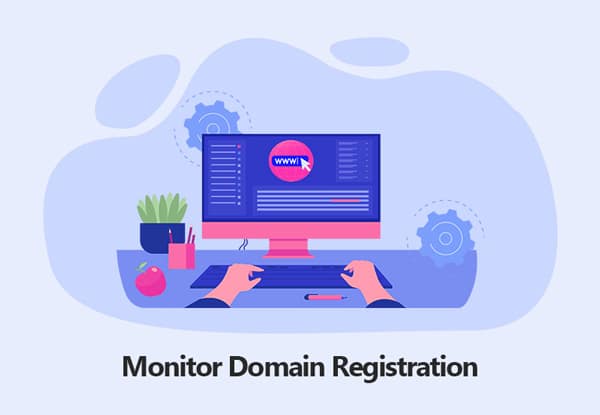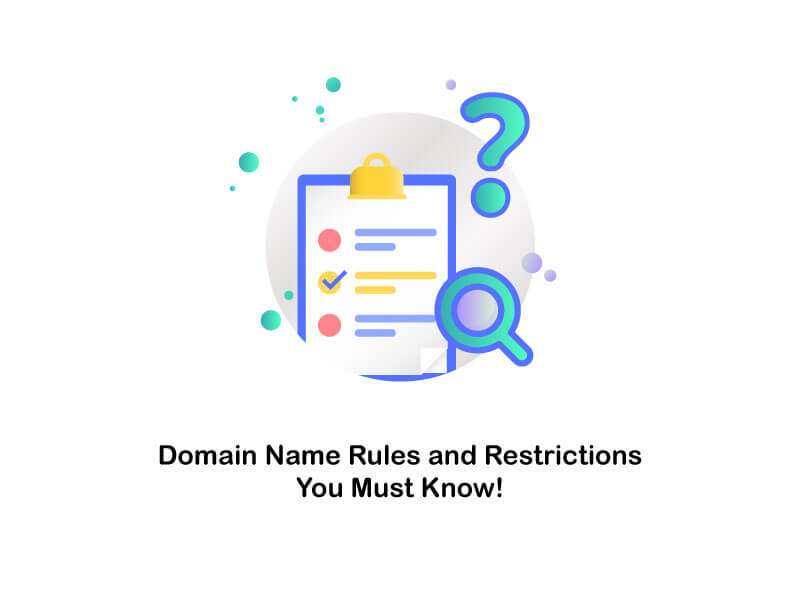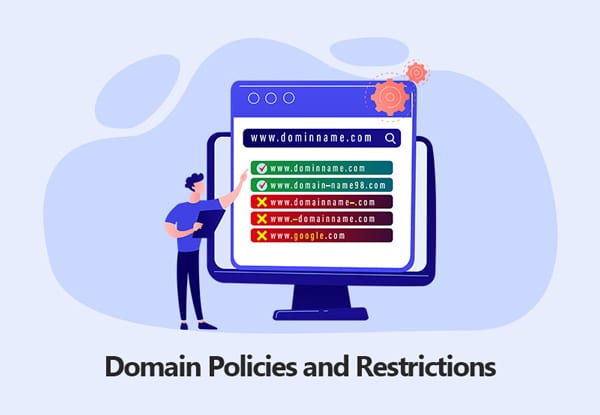Knowing domain name rules and finding and securing your domain name is of the utmost importance when you own a website. There are several rules that you need to know to ensure complete protection. The cyber-world is full of hacks and cracks, but following the basic domain naming conventions can help you protect your website against theft and losses. Here are the basic rules and regulations that can help determine company data security.
The Top 5 Domain Name Rules Are as Follows
1. Select a Major Registrar

Check out the best place to buy domain name in this article!
2. Self -Registration

One of the other domain name registration rules is self-registration. When you opt for the significant registrars, it comprises small sites from where even the internet newbies might purchase a domain. However, it is advisable not to delegate this task to website developers or external vendors. Registering the domain should also not involve low-level personnel or IT professionals from other sources. So, as a result, it is advisable to register the domain by yourself only.
If you desire to check the availability status of a domain and whois information explained , click on the provided link!
3. Consider the ‘Big Four’ Points by Yourself

Amongst the other website domain name format rules, it is also essential to comply with the primary four responsibilities related to the domain. It includes administrative details, billing details, technical details, and the registrant.
It is vital to take hold of the task by yourself for all these four things. A registrant is a lawful owner of the domain and the most critical entity. Hence, there is no specific reason why a third party should control your domain regulation. Therefore, it is advisable to keep the developer and ISP aloof from this aspect. You also have to avail of the complete e-mail control on the domain.
To find out the answer to the question ” do domain extensions matter with search rankings seo strategy”, click on the provided link!
4. Choose a Unique E-Mail and Physical Address

This is one of the other domain name rules and regulations that a registrar would ask you in the e-mail address. You need to pick an address that could last for the long term. After creating an account, you want to keep it for several years. On that ID, you will receive important notices and details. Hence, it would be best to evaluate them critically, and the same goes for the physical address you are adding. Remember that the renewal date or ‘Docket’ ensures that you are always before time in terms of everything.
If you aim to check the internationalized domain names examples , click on the link provided!
5. Monitor Domain Registration
The fifth item of domain name usage rules is that you should closely observe the registration at least four times a year and ensure its lawful working. Periodic checks help you evaluate unauthorized changes or breaches of crucial rules. Making alterations to the contact details is another aspect that needs surveillance. You can also optimize the ‘WHOIS’ feature for this purpose. It shares pertinent information related to various domains. With its help, you can evaluate all types of unlawful alterations to the registrar.
Other Domain Registration Rules and Restrictions

What about the valid domain name rules? Whether all the domain name format rules are correct or not, you can have a quick overview of its essential rules as they are given below:
- One of the critical domain name rules and regulations is that you need to ensure that the domain name you select is not case-sensitive. It refers to the kind of alphabet and numeric you select. Apply a bit of a trick to determine a certain level of uniqueness.
- As per the top rules, there should not be spaces between. Using a dash for some specific words in SLD clarifies the whole scenario. While many people believe that Google penalizes for the dashes, there is no evidence of the same. Your page rankings would remain intact. Also, the users can get a better idea of what the site is all about. A domain name should be free from much technical clutter.
- Inclusion of numbers, dashes, and letters is allowable in the domain name, but the usage of special characters like? And! is not considerable.
- SLDs of the domain should have two characters and include a 63-character limit. On the other hand, there is no specific limit to TLDs.
In order to know more about what is a top-level domain name example , please click on the link provided!
Domain Name Registration Restrictions
- Legally, a registered domain name cannot include anything apart from numbers, hyphens, and letters. Also, you cannot contain any characters in it, and you should pay attention to domain name rules characters.
- One cannot include hyphens at the start and end of any domain name.
- Using a domain name that is already registered is against the domain policies.
- Unlike in e-mail addresses, case sensitivity is non-applicable in domain names.
- Numbers in domain names SEO isn’t a good idea. SO it is better to stay away from domain names that include numbers or other non-standard characters.
- The last item of rules for selecting a domain name is to ensure that you do not breach the trademark of any other company. It is a significant offense to copy or use another entity’s domain name.
If you are wondering can you use a hyphen in a domain name , check this article out!
The above stated are the standard domain name registration rules followed by almost every country. However, certain places have additional restrictions on picking the correct domain names.
- Co.uk or Org.UK is a good choice for UK domain users, but the kind of organization your hold becomes a deciding factor. Whether you are an individual or an entity, the registration of domains varies widely.
- Mobi Domain or ‘Mobile-friendly’ domains also come under specific rules for domain names. Using some .mobi guidelines can help follow the rules for the correct domain names.
- Domain names such as ltd. UK and plc. The UK prevailed a restriction on the public or private limited companies. Hence, if you are amongst such companies, select the domain accordingly.
- One of the domain name rules referring to higher education is that they can register as Gov. or Ac. Domain names.
To find out the impact of using domain name keywords , check this article out!
Frequently Asked Questions
Can I Use an Ampersand in a Domain Name?
Unfortunately, you can’t use an ampersand (&) as part of your domain name. Letters, numbers, and hyphens are among domain name rules characters you can use in your domain name. For example, the following domain name is not allowed; car&industry.com.
How Many Letters Should a Website Have?
Remember to consider domain name rules and keep your domain name concise. 6-14 characters are the best, and also the shorter, the better. As said before, most likely, the more temporary domain names were taken a long time ago.
Can a Domain Name Start With a Number?
Numbers and hyphens are the only symbols allowed in your domain name., but domain names cannot begin or end with a hyphen. You can use numbers, letters, and hyphens, for example, register-7.com.
How Many Letters Is Too Long for a Domain Name?
The maximum number of characters you can have in a website address left of the “.” is 63 characters. Of course, that’s a long URL, and we don’t recommend choosing such a lengthy domain in any situation. Most likely, the shorter domain names were taken long ago and sold for thousands of dollars.
Can a Domain Name Be All Numbers?
You can have websites with numbers in the address. But a domain name in all numbers is not allowed. Despite the ability to use them, numbers in domains are typically avoided as they can have a negative effect on how intuitive the domain name is to understand.
Putting a number in domain name in an incorrect way may be a barrier for users accessing your website due to not understanding whether the domain name uses a digit character or a written word of a number (for example, “5” versus “five”). Also, as mentioned before, numbers in domain names SEO are not a good idea, and When choosing a domain name for SEO, it’s always better to avoid hyphens and numbers.
How Long Should a Web Address Be?
A web address should not exceed 2000 characters to be interpreted with a Browser. However, web addresses of this length are rare. If you want a URL to appear in the search results complete and not shortened, it should be a maximum of 74 characters.
Final Words
Following all the above restrictions on domain names and policies ensures a unique position in the virtual world. Proper registration, however, does not assure the security of trademarks in any way. Going as per the regular rules for domain names can work perfectly for single website owners. But business and company owners should prefer a trademark registration and consider valid domain name rules to establish a unique identity. You can further do online research to get more details on the latest alterations in rules and restrictions!


Hi, good afternoon
I’ve got a question. Is it OK if I use “.” in a domain name? I mean is it correct if I use two dots at a same time within my domain name like: mydomain.name.com?
Or should it be mydomainname.com?
Thanks